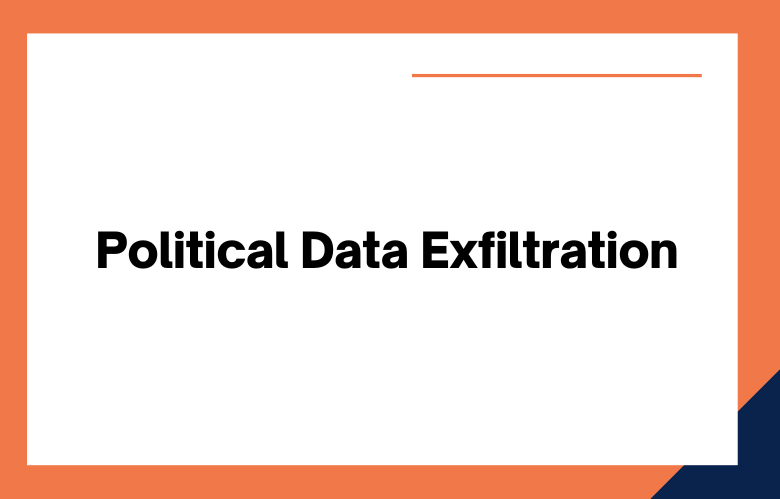Data is a valuable commodity today. Organizations constantly seek an edge, whether used for targeted marketing or to sway public opinion. As a result, political campaigns are a prime target for data exfiltration. We’ll discuss the risks of data exfiltration and offer tips to help prevent it.
Technology has changed the political landscape. Gone are the days of hand-counted ballots and precinct captains whispering votes into ears. In today’s world, data is king, and campaigns gather as much of it as possible.
Unfortunately, this also makes campaigns a prime target for data exfiltration. Here are some points to help protect your data and keep your campaign safe.
Political organizations are prime targets for data exfiltration by hackers. The confidential information these groups keep can be used to manipulate public opinion or gain an unfair advantage in elections. To prevent the organization from becoming victim, follow these tips to secure your data.
What is Data Exfiltration?
Data exfiltration is the unlawful transfer of data from a computer. It is done by various means, including data interception, malware, and hacking. Data exfiltration can have severe consequences for businesses and individuals, such as identity theft, data breaches, and financial loss.
Data exfiltration is a process of copying or transferring data from a computer or network to an external destination without the knowledge or permission of the legitimate owner.
In other words, data exfiltration is a form of data theft.
Data exfiltration is performed manually by an authorized user or is done automatically by malicious software.
Either way, the goal is to extract sensitive data without detection.
Data exfiltration is an unauthorized transfer of data from a computer. It is done physically by copying data to a removable storage device or network file share or remotely sending data over the network to an external destination.
Data exfiltration can steal confidential information or disrupt operations. It can happen through various means, such as downloading data to removable media, sending data over the network, or physically removing the storage device.
Data exfiltration is a severe problem because it can lead to the loss of proprietary information, trade secrets, and confidential customer data. It can also put individuals at risk by revealing personal information like social security numbers and credit card numbers.
Organizations can protect themselves from data exfiltration by implementing security measures like firewalls, intrusion detection systems, and data encryption. They should also train their employees on security Awareness and monitor their activity for any signs of unauthorized data transfer.
- Data Exfiltration is the term used for unauthorized data transfer.
- This can happen when an outside party hacks into a computer system and steals sensitive information.
- It can also happen when an employee downloads company data onto a personal device without permission.
- Data exfiltration can be challenging to detect but can have severe implications for businesses and individuals.
- That’s why it’s essential to be aware of the risks and take steps to protect your data.
To understand data exfiltration, let’s take a step back and examine what data is. Data can be considered information that categorizes and gives a specific purpose. This purpose can be anything from organizing grocery lists to running large businesses.
We have a general understanding of data; we can move on to data exfiltration. Data exfiltration is the process of moving data from one location to another. It is for various reasons, such as backing up important files or sharing information with others.
There are a few different ways to exfiltrate data, but computer networks are the most common method. Connect two devices, a laptop, and a smartphone; data can transfer from one device to another.
Data exfiltration is a necessary process that helps people keep their critical information safe. Understanding how it works can better protect your data from being stolen or lost.
Data exfiltration: The process of extracting data from a secure location.
In other words, data exfiltration is stealing data from a protected place. It is by various means, such as using an external storage device, emailing the data to an unauthorized account, or simply copying it to a personal laptop.
Data exfiltration is a severe security concern because it allows thieves to access sensitive information they otherwise access. It leads to identity theft, fraud, and other problems. The best way to protect against data exfiltration is to encrypt all sensitive data and limit access to only those who need it.
What is Political Data Exfiltration?
“Exfiltration” refers to unauthorized data transfer from a computer or network. In the context of politics, data exfiltration can refer to the act of extracting sensitive political data from an individual or organization. It is for various reasons, such as to gain intelligence on an opponent, discredit a political figure, or sow chaos during an election. While government agencies or private individuals can carry out data exfiltration, it helps prevent computer viruses and other malicious software.
- Political data exfiltration refers to the unauthorized transfer of sensitive political data.
- This can involve downloading data onto an external storage device, emailing data to a personal account, or uploading data to a public website.
- Data exfiltration can have severe implications for national security, as it can provide adversaries with information to influence or manipulate public opinion.
- For this reason, it is vital for organizations and individuals handling sensitive political data to take measures to prevent data exfiltration.
- It is the unsanctioned data transfer from a computer, especially by someone with unauthorized access.
- It is done for many reasons, such as financial gain, espionage, or to disrupt operations.
- Data exfiltration perform through many means, such as hacking, malicious insiders, removable media, or social engineering.
- Effective countermeasures can help to prevent data exfiltration and protect an organization’s information assets.
Data exfiltration is the unauthorized transfer of data from a computer. In politics, data exfiltration can refer to the unauthorized transfer of political data, such as voter records or election results. This type of data exfiltration can have serious consequences, as it can allow for the manipulation of political outcomes.
Tips to Prevent Political Data Exfiltration
- Use two-factor authentication
- Create strong passwords
- Update your software regularly
- Be aware of email and phone scams
- Only open emails from trusted senders
- Please don’t click on links or attachments in emails unless you’re sure they’re safe.
- Avoid public Wi-Fi networks whenever possible
- Use a VPN when browsing the internet
- Install a good antivirus program and keep it up to date
- Only open emails from people you know
- Regularly back up your data
- Educate yourself about phishing attacks
- Keep your software up to date
- Use unique passwords for each account
- Change your passwords often
- Enable two-factor authentication whenever possible
- Scan your computer for malware and viruses regularly
- Do not open attachments or click on links in emails from people you don’t know
- Back up your data regularly
- Regularly update your software
- Use different passwords for each account
- Update your software regularly
- Restrict access to sensitive data
- Educate employees about cybersecurity threats
- Use a secure Wi-Fi connection when accessing the internet
- Install antivirus and malware protection on your devices
- Install a firewall and malware protection software
- Monitor your network for any unusual activity
- Create an incident response plan in case of a data breach
- Keep your software up-to-date
- Install a firewall and make sure it is up-to-date
- Only download software from trusted sources
- Backup your data regularly
- Use antivirus software and keep it up-to-date
- Monitor your network for unusual activity
- Use strong passwords and change them regularly
- Install good antivirus software and keep it up to date
- Only open emails from people you know
- Be careful about what information you share online
- Regularly back up your data
- Keep your operating system and software updated
- Implement two-factor authentication
- Restrict access to sensitive data to authorized users only
- Periodically scan your systems for malware and viruses
- Backup your data regularly
- Use encryption software to protect your data while it is in transit
- Periodically audit your security measures to ensure they are effective
- Back up your information regularly
- Be aware of what you’re posting online
- Keep your devices updated with the latest security patches
- Educate your employees on cybersecurity best practices
- Install a firewall and malware protection software
- Regularly back up your data
- Monitor your network for suspicious activity
- Use encryption to protect your data
Conclusion
As we’ve seen, data exfiltration is a severe issue for any organization. The best is to prevent this by carefully planning and executing security measures. If you’re concerned about the safety of your data or want help implementing the necessary precautions, contact us.
Our team of experts can provide political data security consulting that will keep your information safe from prying eyes.
Political Data Exfiltration: Tips to Prevent It – FAQs
What Is Political Data Exfiltration
Political data exfiltration is the unauthorized transfer or theft of sensitive political data from a secure system to an external location, often for malicious purposes.
Why Is Political Data Exfiltration A Serious Threat
It compromises campaign strategies, exposes voter information, and can be used to manipulate election outcomes or damage reputations.
What Types Of Data Are Targeted In Political Data Exfiltration
Targets often include voter databases, donor lists, campaign strategies, internal communications, and policy documents.
How Does Political Data Exfiltration Typically Occur
It can occur through phishing attacks, malware infections, insider threats, unsecured networks, or exploitation of software vulnerabilities.
Who Are The Common Perpetrators Of Political Data Exfiltration
Perpetrators can include cybercriminals, political opponents, nation-state actors, or disgruntled insiders.
What Are The Consequences Of Political Data Exfiltration For Campaigns
Consequences may include loss of voter trust, financial damage, legal penalties, and disruption of campaign activities.
How Can Political Campaigns Detect Data Exfiltration
Detection methods include network traffic monitoring, anomaly detection tools, intrusion detection systems, and regular security audits.
What Role Does Cybersecurity Play In Preventing Data Exfiltration
Strong cybersecurity measures like encryption, access control, and regular vulnerability assessments are essential for prevention.
How Can Insider Threats Be Mitigated In Political Campaigns
By implementing strict access controls, monitoring user activity, conducting background checks, and training staff on security protocols.
What Is The Impact Of Political Data Exfiltration On Voter Privacy
It can expose personal voter information, leading to identity theft, harassment, or targeted misinformation campaigns.
How Can Political Data Exfiltration Influence Election Outcomes
Stolen data can be used to create targeted disinformation, sway public opinion, or undermine confidence in the electoral process.
What Laws Govern Political Data Protection And Breach Response
Laws vary by country, but often include data protection acts, election commission guidelines, and cybersecurity regulations.
How Should Campaigns Respond To A Data Exfiltration Incident
They should immediately secure systems, investigate the breach, notify affected parties, and comply with legal reporting requirements.
What Are The Best Practices To Prevent Political Data Exfiltration
Best practices include multi-factor authentication, encryption, staff training, and continuous monitoring of network activity.
How Can International Actors Exploit Political Data Exfiltration
Foreign entities may use stolen data to interfere in elections, spread propaganda, or destabilize political systems.
What Role Does Artificial Intelligence Play In Detecting Data Exfiltration
AI can analyze patterns, flag anomalies, and detect unusual data transfers faster than traditional methods.
How Can Political Parties Secure Their Data During Remote Work
They can use VPNs, encrypted communication platforms, and enforce secure device usage policies for staff.
What Is The Difference Between Data Exfiltration And Data Breach
Data exfiltration refers specifically to the unauthorized removal of data, while a data breach is a broader term covering any unauthorized access or exposure.
How Often Should Political Campaigns Conduct Cybersecurity Audits
At least quarterly, and after any major system update or suspected security incident.
Why Is Staff Cybersecurity Training Crucial In Preventing Data Exfiltration
Human error is a leading cause of data loss, so educating staff reduces the risk of falling victim to phishing and other attacks.











